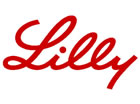|
|
|
July
10,
2009 -- 1:50pm PDT
Prasugrel / Effient Approved by FDA
 After
a year-and-a-half of review, amid concerns over potentially serious
bleeding complications, the FDA today
approved Eli Lilly's blood thinner Prasugrel as a drug "to reduce
the risk of blood clots from forming in patients who undergo angioplasty"
(it
will
be marketed in the U.S. as Effient). Prasugrel will now be an alternative
to Bristol-Myers
Squibb's Plavix, although the FDA approval comes with
a "black box warning" to physicians to be aware of potentially
fatal bleeding complications -- this warning would ostensibly alert
physicians
to monitor patients carefully. Prasugrel
was shown in studies of over 13,000 patients to prevent more heart
attacks than Plavix, although
there was more internal bleeding. After
a year-and-a-half of review, amid concerns over potentially serious
bleeding complications, the FDA today
approved Eli Lilly's blood thinner Prasugrel as a drug "to reduce
the risk of blood clots from forming in patients who undergo angioplasty"
(it
will
be marketed in the U.S. as Effient). Prasugrel will now be an alternative
to Bristol-Myers
Squibb's Plavix, although the FDA approval comes with
a "black box warning" to physicians to be aware of potentially
fatal bleeding complications -- this warning would ostensibly alert
physicians
to monitor patients carefully. Prasugrel
was shown in studies of over 13,000 patients to prevent more heart
attacks than Plavix, although
there was more internal bleeding.
 It
remains to be seen what the availability of prasugrel will mean
for stent patients. Currently, patients receiving drug-eluting
stents are
given Dual AntiPlatelet Therapy (DAPT) which is aspirin
for life and Plavix for a year or more. There have been a number
of studies regarding the optimum length for DAPT: some have
shown no benefit beyond six months, others indicate increased benefit
and protection against late stent thrombosis; one observational
study from the VA even noted that that there may be a "Plavix-rebound"
effect, a doubling of heart attack or death within 90 days after stopping
Plavix. Furthermore, some patients have been shown to be "Plavix-resistant"
and, as such, are at higher risk for stent thrombosis. Given the
number of sessions at national cardiology meetings on these issues,
how prasugrel / Effient fits into post-stent therapy will no doubt
be the subject of much
debate. It
remains to be seen what the availability of prasugrel will mean
for stent patients. Currently, patients receiving drug-eluting
stents are
given Dual AntiPlatelet Therapy (DAPT) which is aspirin
for life and Plavix for a year or more. There have been a number
of studies regarding the optimum length for DAPT: some have
shown no benefit beyond six months, others indicate increased benefit
and protection against late stent thrombosis; one observational
study from the VA even noted that that there may be a "Plavix-rebound"
effect, a doubling of heart attack or death within 90 days after stopping
Plavix. Furthermore, some patients have been shown to be "Plavix-resistant"
and, as such, are at higher risk for stent thrombosis. Given the
number of sessions at national cardiology meetings on these issues,
how prasugrel / Effient fits into post-stent therapy will no doubt
be the subject of much
debate.
Effient is manufactured by Eli Lilly and Company of Indianapolis, in partnership
with Tokyo-based Daiichi Sankyo Ltd.
Late Update: Here's part of the statement from the FDA:
Effient was studied in a 13,608-patient
trial comparing it to the blood-thinning drug, Plavix (clopidogrel),
in patients with a threatened heart attack or an actual heart
attack who were about to undergo angioplasty.
The fraction of patients who had subsequent
non-fatal heart attacks was reduced from 9.1 percent in patients
who received Plavix to 7.0 percent in patients who received
Effient.While the numbers of deaths and strokes were similar
with both drugs, patients with a history of stroke were more
likely to have another stroke while taking Effient. In addition,
there was a greater risk of significant, sometimes fatal
bleeding seen in patients who took Effient. “Effient offers physicians an alternative treatment for preventing dangerous
blood clots from forming and causing a heart attack or stroke during or after
an angioplasty procedure,” said John Jenkins, M.D., director of the Office of
New Drugs, in the FDA’s Center for Drug Evaluation and Research.“Physicians must
carefully weigh the potential benefits and risks of Effient as they decide which
patients should receive the drug.”
The drug’s labeling will include a boxed warning
alerting physicians that the drug can cause significant, sometimes fatal, bleeding.
The drug should not be used in patients with active pathological bleeding, a
history of mini-strokes (transient ischemic attacks) or stroke, or urgent need
for surgery, including coronary artery bypass graft surgery. |
|
|

|


 After
a year-and-a-half of review, amid concerns over potentially serious
bleeding complications, the FDA today
approved Eli Lilly's blood thinner Prasugrel as a drug "to reduce
the risk of blood clots from forming in patients who undergo angioplasty"
(it
will
be marketed in the U.S. as Effient). Prasugrel will now be an alternative
to Bristol-Myers
Squibb's Plavix, although the FDA approval comes with
a "black box warning" to physicians to be aware of potentially
fatal bleeding complications -- this warning would ostensibly alert
physicians
to monitor patients carefully.
After
a year-and-a-half of review, amid concerns over potentially serious
bleeding complications, the FDA today
approved Eli Lilly's blood thinner Prasugrel as a drug "to reduce
the risk of blood clots from forming in patients who undergo angioplasty"
(it
will
be marketed in the U.S. as Effient). Prasugrel will now be an alternative
to Bristol-Myers
Squibb's Plavix, although the FDA approval comes with
a "black box warning" to physicians to be aware of potentially
fatal bleeding complications -- this warning would ostensibly alert
physicians
to monitor patients carefully.  It
remains to be seen what the availability of prasugrel will mean
for stent patients. Currently, patients receiving drug-eluting
stents are
given Dual AntiPlatelet Therapy (DAPT) which is aspirin
for life and Plavix for a year or more. There have been a number
of studies regarding the optimum length for DAPT: some have
shown no benefit beyond six months, others indicate increased benefit
and protection against late stent thrombosis; one observational
study from the VA even noted that that there may be a "
It
remains to be seen what the availability of prasugrel will mean
for stent patients. Currently, patients receiving drug-eluting
stents are
given Dual AntiPlatelet Therapy (DAPT) which is aspirin
for life and Plavix for a year or more. There have been a number
of studies regarding the optimum length for DAPT: some have
shown no benefit beyond six months, others indicate increased benefit
and protection against late stent thrombosis; one observational
study from the VA even noted that that there may be a "